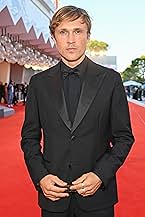In 1980s Naples, young Fabietto pursues his love for football as family tragedy strikes, shaping his uncertain but promising future as a filmmaker.In 1980s Naples, young Fabietto pursues his love for football as family tragedy strikes, shaping his uncertain but promising future as a filmmaker.In 1980s Naples, young Fabietto pursues his love for football as family tragedy strikes, shaping his uncertain but promising future as a filmmaker.
- Nominated for 1 Oscar
- 32 wins & 66 nominations total
Betty Pedrazzi
- Baronessa Focale
- (as Betti Pedrazzi)
- Director
- Writer
- All cast & crew
- Production, box office & more at IMDbPro
Featured reviews
It's been a long time since I've seen a great italien film, and i always say this "Sorrentino is the closest we're ever gonna have to Fellini". One of the realest, saddest and funniest movies of 2021!
Paolo Sorrentino's autobiographical picture follows the filmmaker's stand-in Fabietto (Filippo Scotti) as an introverted teenager in 80s era Naples. His father Saverio (the great Toni Servillo) and Mother Maria (Teresa Saponangelo; quite engaging) live a comfortable life with their other son Marchino (Marlon Joubert). There is also an extended family of colorful relatives and circle of friends. Fabietto can't help but be mesmerized by his bodacious and extroverted aunt Patrizia (Luisa Ranieri).
Sorrentino has never made a secret about his admiration for Federico Fellini and the first half of the picture is clearly designed with the Maestro's masterpiece AMARCORD in mind. Instead of the rise of Mussolini as a backdrop that ties the vignettes together, here it's the arrival of soccer great Diego Maradona who signs with Napoli and becomes a local legend (the title is in reference to his most famous play). It's when things get more serious in the second half where one sees what inspired Sorrentino to tell such a personal tale. Fabietto is faced with having to truly grow up - and, in a hurry. To decide what his future may be. The anecdotes and episodes continue to be serio-comic and filled with often over the top details. It's very much in the vein of Fellini's early classic, I VITELLONI.
Actor Scotti does very well in trying to channel Sorrentino's alter-ego. He has a natural presence and he does what he can to give the viewer a reason to care about his life. Still, Sorrentino's screenplay never quite unites all of its various threads into a cohesive narrative. We only see snippets of Fabietto's interest in cinema. Not only is Fellini mentioned, but so are other major Directors of Italian cinema such as Franco Zefferelli and Sergio Leone. But, it is local Neapolitan filmmaker Antonio Capuano (played by Ciro Capano) who gives young Fabietto some important but stern advice (Capano became a mentor to Sorrentino). It's a strong sequence, but, far too little and too late in the proceedings to anchor the movie. Just because a film is 'from the heart' doesn't mean it translates well to the screen. One has to invite in the viewer. Here, far too much of it plays like Sorrentino's personal notebook. It's vividly produced with some very fine cinematography by Daria D'Antonio and it has a lively cast, but, it never truly sings. HAND OF GOD gives the viewer some insight into Sorrentino's past, but, it never quite fully connects.
Sorrentino has never made a secret about his admiration for Federico Fellini and the first half of the picture is clearly designed with the Maestro's masterpiece AMARCORD in mind. Instead of the rise of Mussolini as a backdrop that ties the vignettes together, here it's the arrival of soccer great Diego Maradona who signs with Napoli and becomes a local legend (the title is in reference to his most famous play). It's when things get more serious in the second half where one sees what inspired Sorrentino to tell such a personal tale. Fabietto is faced with having to truly grow up - and, in a hurry. To decide what his future may be. The anecdotes and episodes continue to be serio-comic and filled with often over the top details. It's very much in the vein of Fellini's early classic, I VITELLONI.
Actor Scotti does very well in trying to channel Sorrentino's alter-ego. He has a natural presence and he does what he can to give the viewer a reason to care about his life. Still, Sorrentino's screenplay never quite unites all of its various threads into a cohesive narrative. We only see snippets of Fabietto's interest in cinema. Not only is Fellini mentioned, but so are other major Directors of Italian cinema such as Franco Zefferelli and Sergio Leone. But, it is local Neapolitan filmmaker Antonio Capuano (played by Ciro Capano) who gives young Fabietto some important but stern advice (Capano became a mentor to Sorrentino). It's a strong sequence, but, far too little and too late in the proceedings to anchor the movie. Just because a film is 'from the heart' doesn't mean it translates well to the screen. One has to invite in the viewer. Here, far too much of it plays like Sorrentino's personal notebook. It's vividly produced with some very fine cinematography by Daria D'Antonio and it has a lively cast, but, it never truly sings. HAND OF GOD gives the viewer some insight into Sorrentino's past, but, it never quite fully connects.
For a reason I could never understand, everyone expected a "Rome" from Sorrentino. And out of every 5 reviews written about this movie, 4 of them mentioned the movie 'ROMA'.
Sorrentino made his own 'È stata la mano di Dio' rather than his own Rome, and he did it well.
I didn't want to watch this movie without a proper copy, when Netflix came to my rescue.
It was a beautiful film with everything from its editing to the role its screenplay plays in storytelling, from the angle choices of the cinematographer to the sometimes exaggerated and everywhere calm performances of the actors.
It's been a long time since I heard Italian "in a good sense" in the cinema.
And it was worth the wait.
Sorrentino made his own 'È stata la mano di Dio' rather than his own Rome, and he did it well.
I didn't want to watch this movie without a proper copy, when Netflix came to my rescue.
It was a beautiful film with everything from its editing to the role its screenplay plays in storytelling, from the angle choices of the cinematographer to the sometimes exaggerated and everywhere calm performances of the actors.
It's been a long time since I heard Italian "in a good sense" in the cinema.
And it was worth the wait.
Having seen four of Paolo Sorrentino's movies now, I have finally and regrettably seen enough to admit that I am not a fan of his work. For some reasons, his movies don't engage me enough emotionally to care. Le conseguenze dell'amore (The Consequences of Love) was an interesting look into the life of a man with a dark secret, but I believed that it would have worked better as a character study if the revelation at the end had come earlier in the movie. I liked Youth better, a modest and entertaining contemplation of ageing, even though as a 40-something, it didn't fully move me either.
His celebrated La Grande Bellezza (The Great Beauty) was voted Best Movie of the Year by many, but it left me puzzled, as I saw little more than short vignettes about Roman life without much of an overall encompassing idea, story thread or theme. I watched it again to make sure that I didn't miss anything, but my response was largely the same: lots of eye candy with little nutritional value for the mind. And that is probably no coincidence, because I have the same problems and more with The Hand of God.
I know that Sorrentino's work is quite beloved and that many people probably enjoyed or will enjoy this film as a lovingly disarming portrait of family and tragedy, wrapped around a coming-of-age story. Good for them, because what I unfortunately saw again was a too loosely connected series of scenes that emotion-wise go all over the place, and felt more like numerous short films tacked together than a sincere chronicle. It took me almost half the movie to get a grip on the many family members who Sorrentino loves to present with all their peculiarities, but most of these characters are merely one-dimensional charicatures with a social or physical handicap who don't get the screen time needed to get emotionally invested in them. This would have been okay if this had been a broad comedy or even a crude farce about a dysfunctional family, but I simply didn't find it that funny. Although some scenes elicited a smile, none of them are exactly laugh out loud, and since they didn't really connect or reinforced one another, I saw little progress in the story.
When the big plot development happens in the second half, things started to look more promising for a while. But even here, Sorrentino barely uses the plot elements at his disposal to pull at some heartstrings. Every time something seems ready to be fleshed out, we cut to a completely different scene where we can enjoy the great locations and photography or another weird character, but instead of depth, it adds yet another new shade to a canvas that is already full of a wide variety of colored spots. I failed to see a bigger picture, to my regret.
Sorrentino is clearly more of a moodpainter than a good storyteller, and that is apparently what a lot of viewers love about his movies. I remember the most famous scene from Youth where Michael Caine and Harvey Keitel watch in dumbstruck awe as a beautiful young and naked woman enters their swimming pool, and Hand of God has a similar scene with Aunt Patrizia that elicits a similar mix of sensations, somewhere between awkwardness and lustful ecstasy. So for those who also loved La Grande Bellezza for its colorful mix of emotions and sensations, go and watch it. For the rest, I would recommend the Italian classic Cinema Paradiso, a deeply moving coming of age story that did work for me, or even Disney's Encanto for a truly funny and heartwarming story about dysfunctional families.
His celebrated La Grande Bellezza (The Great Beauty) was voted Best Movie of the Year by many, but it left me puzzled, as I saw little more than short vignettes about Roman life without much of an overall encompassing idea, story thread or theme. I watched it again to make sure that I didn't miss anything, but my response was largely the same: lots of eye candy with little nutritional value for the mind. And that is probably no coincidence, because I have the same problems and more with The Hand of God.
I know that Sorrentino's work is quite beloved and that many people probably enjoyed or will enjoy this film as a lovingly disarming portrait of family and tragedy, wrapped around a coming-of-age story. Good for them, because what I unfortunately saw again was a too loosely connected series of scenes that emotion-wise go all over the place, and felt more like numerous short films tacked together than a sincere chronicle. It took me almost half the movie to get a grip on the many family members who Sorrentino loves to present with all their peculiarities, but most of these characters are merely one-dimensional charicatures with a social or physical handicap who don't get the screen time needed to get emotionally invested in them. This would have been okay if this had been a broad comedy or even a crude farce about a dysfunctional family, but I simply didn't find it that funny. Although some scenes elicited a smile, none of them are exactly laugh out loud, and since they didn't really connect or reinforced one another, I saw little progress in the story.
When the big plot development happens in the second half, things started to look more promising for a while. But even here, Sorrentino barely uses the plot elements at his disposal to pull at some heartstrings. Every time something seems ready to be fleshed out, we cut to a completely different scene where we can enjoy the great locations and photography or another weird character, but instead of depth, it adds yet another new shade to a canvas that is already full of a wide variety of colored spots. I failed to see a bigger picture, to my regret.
Sorrentino is clearly more of a moodpainter than a good storyteller, and that is apparently what a lot of viewers love about his movies. I remember the most famous scene from Youth where Michael Caine and Harvey Keitel watch in dumbstruck awe as a beautiful young and naked woman enters their swimming pool, and Hand of God has a similar scene with Aunt Patrizia that elicits a similar mix of sensations, somewhere between awkwardness and lustful ecstasy. So for those who also loved La Grande Bellezza for its colorful mix of emotions and sensations, go and watch it. For the rest, I would recommend the Italian classic Cinema Paradiso, a deeply moving coming of age story that did work for me, or even Disney's Encanto for a truly funny and heartwarming story about dysfunctional families.
It is a very difficult challenge to try to lightly tell such a personal and traumatic drama as it happens in "The hand of God". The director Sorrentino tries to face it without veils and metaphors, keeping only his very personal taste for the grotesque and decadence because- as he tries to explain several times in the film- after the personal tragedy he experienced as a teenager, he no longer likes reality: "the reality is poor". Yet reality can also be extraordinary, so much so as to generate one of the best contemporary Italian directors from a such atrocious trauma.
Did you know
- TriviaAccording to Paolo Sorrentino, it was Alfonso Cuarón's Roma (2018), which was based on Cuaron's childhood in Mexico City, that gave Sorrentino permission to commit his own experience to film. For Sorrentino realized that "a personal, private film could tell a universal story."
- Quotes
Antonio Capuano: Remember, those without courage don't sleep with beautiful women.
- SoundtracksNapule è
Written and performed by Pino Daniele
- How long is The Hand of God?Powered by Alexa
Details
- Release date
- Countries of origin
- Official site
- Languages
- Also known as
- Fue la mano de Dios
- Filming locations
- Production companies
- See more company credits at IMDbPro
Box office
- Budget
- €13,049,974 (estimated)
- Gross worldwide
- $167,909
- Runtime2 hours 10 minutes
- Color
- Sound mix
- Aspect ratio
- 2.39 : 1
Contribute to this page
Suggest an edit or add missing content



































